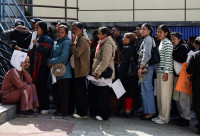National
Teachers end protest after six-point deal
Those under relief quota, however, reject the agreement and plan to continue the Kathmandu-centric agitation.
Binod Ghimire
The Nepal Teachers’ Federation has called off its Kathmandu-centric agitation after sealing a six-point deal with the government.
The federation, an elected umbrella body of various teachers’ unions, had been hitting the streets objecting to the School Education bill registered in the House of Representatives last week. It withdrew the protests and the teachers agreed to return to work after the government made a written commitment to incorporate their concerns by revising the bill.
“The demands of the agitating teachers would be included in the school education law following due process respecting the supremacy of the Parliament,” Minister for Communications and Information Technology Rekha Sharma, who is also a government spokesperson, told the media. Cross-party lawmakers can register amendments to the bill once the lower house completes a theoretical discussion on it.
The government has also agreed to list the public school teachers in the government’s order of precedence based on their ranks. The agreement was reached between the government panel led by Deputy Prime Minister and Minister for Home Affairs Narayan Kaji Shrestha and the teachers’ panel led by Kamala Tuladhar, chairperson of the federation.
“We have withdrawn our protest programme following the agreement,” Tuladhar said. “The teaching-learning in schools will resume from Sunday.”
Over five million children from close to 29,000 public schools were deprived from study following the protest that began Wednesday. Thousands of teachers from the different parts of the country have gathered in the Capital to pressure the government.
Although the federation has signed the agreement, the Relief Quota Teachers’ Association, however, has refused to abide by the deal. It has announced that it will continue the protest.
Relief quota teachers are individuals employed on a contractual basis by local units to address the shortage of teachers at community schools. There are around 40,000 such teachers.
The 75 percent of the temporary and relief quota teachers will be allowed to compete in the internal competitions for the permanent posting. The relief quota teachers have been demanding that either all 40,000 of them should be allowed to participate in the internal competitions or they should be allowed to continue teaching until their retirement age of 60.
Shyam Ghimire, central committee member of the Nepal Relief Quota Teachers’ Association, said they are against the agreement. “The officials of the federation signed the agreement by ignoring our demands. We object to it,” he told the Post. “We will continue our protest.” There has been an agreement that the government would facilitate the revision of the school education bill respecting the parliamentary system and practice. The provision was introduced as the executive would be seen intervening in the jurisdiction of the Parliament if it agrees to revise the bill, which is now the property of the House.
“There will be an expert committee with the representation from the federation to study the issue of teacher integration and periodic promotion,” reads one of the points in the agreement. The other point says a provision would be inducted in the bill ensuring that the teachers do not face any actions without proper justification.
There won’t be transfer of the teachers without the consent of the head teachers while the transfer of the head teacher would be done in consent with the school management committee, as per the agreement.
Making the contribution-based social security scheme for the teachers on par with the civil servants and having a legal provision that will ensure that teachers will get different types of allowances similar to that of the civil servants is also a part of the agreement.
“The regulation (of the School Education Act) would be drafted with representation from education experts and the teachers’ federation,” reads the agreement. The bill must be endorsed to become an Act. Furthermore, regulations have to be formulated to execute the Act.
Through the agreement the government has pledged to protect the trade union rights of the teachers. Similarly, setting up a standard for the appointment, minimum salary, social security and record keeping of the teachers from private schools is also part of the agreement.




 20.9°C Kathmandu
20.9°C Kathmandu














